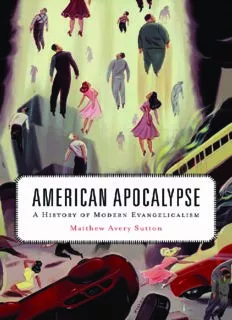
American Apocalypse: A History of Modern Evangelicalism PDF
Preview American Apocalypse: A History of Modern Evangelicalism
AMERICAN APOCALYPSE AMERICAN APOCALYPSE A History of Modern Evangelicalism MATTHEW AVERY SUTTON THE BELKNAP PRESS OF HARVARD UNIVERSITY PRESS Cambridge, Massachusetts | London, Eng land 2014 Copyright © 2014 by the President and Fellows of Harvard College All rights reserved Printed in the United States of America Library of Congress Cataloging- in-P ublication Data Sutton, Matthew Avery, 1975- American apocalypse : a history of modern evangelicalism / Matthew Avery Sutton. pages cm Includes biblographical references and index. ISBN 978-0-674-04836-2 (alk. paper) 1. Evangelicalism—History. 2. United States—Church history—20th century. I. Title. BR1640.S88 2014 277.3'082—dc23 2014014034 To Kristen CONTENTS Preface ix Prologue 1 1. Jesus Is Coming 8 2. Global War and Christian Nationalism 47 3. The Birth of Fundamentalism 79 4. The Culture Wars Begin 114 5. American Education on Trial 148 6. Seeking Salvation with the GOP 178 7. The Rise of the Tyrants 207 8. Christ’s Deal versus the New Deal 232 9. Reviving American Exceptionalism 263 10. Becoming Cold Warriors for Christ 293 11. Apocalypse Now 326 Epilogue 367 Abbreviations 377 Notes 381 Ac know ledgm ents 437 Index 441 PREFACE Ernest Sandeen opened his groundbreaking book The Roots of Fun- damentalism (1970) by noting that ever since fundamentalism’s “rise to notoriety in the 1920s, scholars have predicted the imminent demise of the movement. The Fundamentalists, to return the favor, have pre- dicted the speedy end of the world. Neither prophecy has so far been fulfi lled.” How things have changed since he penned those words. While many fundamentalists and evangelicals continue to predict the speedy end of the world, we no longer expect the fundamentalist- orchestrated revival of radical evangelical religion to dissipate anytime soon. Instead, journalists, historians, sociologists, and pol iti cal scientists have labored to explain its infl uence on American religious life as well as its staying power. This book draws on a lively cast of characters and extensive archival research to document the ways an initially obscure group of charis- matic preachers and their followers have reshaped American religion, at home and abroad, for over a century. Perceiving the United States as besieged by satanic forces—c ommunism and secularism, family break- down and government encroachment— Billy Sunday, Charles Fuller, Billy Graham, and many others took to the pulpit and airwaves to
Description: